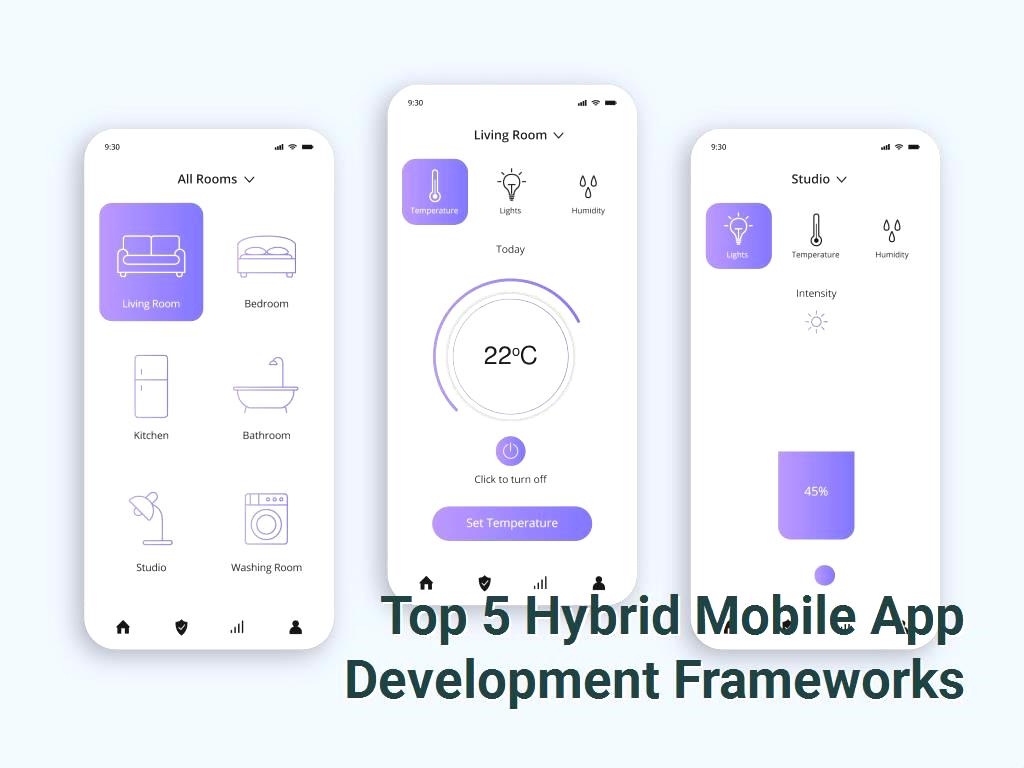Top 5 Hybrid Mobile App Development Frameworks
6 minute(s) read | Published on: Jul 26, 2021 Updated on: Dec 14, 2021 |
The hybrid app is a new trend that has seen growth with a rapid speed within the last few years. Developers are adopting Hybrid apps because it is easy to develop them for multiple platforms. Moreover, hybrid apps also save expenses by reducing the development time and required resources.
In this blog, we are discussing a few leading hybrid mobile app frameworks. These hybrid frameworks are being used by the best app developers for startups.
As per a report by Statista, React Native led the market in 2019 and 2020; the hybrid mobile app framework had 42 percent of the market share in both years. On the second number, Flutter maintained its position in 2019- 2020, both with a market share of 30 and 39 percent respectively in each year.
Furthermore, we will discuss a few top hybrid mobile app development frameworks that are leading the market currently.

1- React Native
One of the most popular hybrid frameworks in the market, React Native, is quite popular among new and expert developers. The platform gives developers the freedom to write codes once to develop apps for multiple platforms. This platform is also known for the flexibility it provides to mobile apps. Moreover, locating bad codes and fixing them is also a piece of cake for React Native. A few brands like Facebook, Skype, Airbnb, and Walmart, among others, are using React Native app platform.
The Benefits of React Native
- Saves development time by reducing the need of re-writing 95 percent of codes for separate platforms
- Allows iOS and Android apps to have stunning features like Native apps
- Apps built on React Native are faster in terms of performance
- Developers can use the same app to move them on other platforms in the future without having to rewrite the codes
- Modifications made in the app can be reviewed in real-time
2- Flutter
Launched in 2018, Flutter is dominating the market quite fast. One of the many reasons for its popularity is that Google released Flutter. Leading apps in the market such as Google Ads, Nubank, Xianyu, and more are developed on Flutter.
Even for a rookie developer, Flutter, this is quite easy to begin with. Thus, many best app developers for startups are adopting Flutter to reduce the development time and money.
The benefits of Flutter
- Flutter is the only hybrid app-development framework that allows sharing the UI and UI codes both
- The "Hot Reload" feature lets you review modifications in the real-time
- Requires at least two times less effort compared to other platforms
- Developers can customize every element of the UI in Flutter
- Multiple plugins for features such as GPS Coordinates, BlueTooth, and more are in ready to use condition on Flutter
3- Xamarin
Owned by Microsoft, Xamarin came into existence in 2011. The hybrid framework is used due to its features that support robust app developments. Xamarin also lets developers use 95 percent of codes for multiple OS without having to rewrite them. Currently, Xamarin is generally used to build apps for Android, iOS, and Microsoft. For Microsoft, Xamarin has adopted an integration with the .Net framework as well. Xamarin currently has 1.4 million individual developers using the framework.

The benefits of Xamarin
- Create the UI once and then share it across multiple platforms
- With Xamarin.iOS, Xamarin.Android, and Xamarin. Windows, you can create platform-specific applications with the same Backend but different UIs
- No need to switch environments for building apps for separate OS
- 60 to 95 percent of code written on Xamarin is sharable
- Modifying source code will apply changes to every other element of the app
4- Cordova
This open-source app framework allows developers to build cross-platform apps with the help of Ionic SDK. The app development framework lets you target any Operating system you want, including Android, Windows, or iOS. Cordova is mainly used by business owners due to its benefits like time-saving and being financially cheaper.
The benefits of Cordova
- Cordova is cheaper and consumes less time
- Got a great community of experienced developers to support
- A layer of the interface provided to developers can convert native codes into cross-platform apps
- Multiple plugins are available to add features to apps
- Allows working with additional frameworks like Kendo UI and jQuery mobile framework
5- Appcelerator Titanium
This best cross-platform mobile app development framework comes as an open-source project that can be used to develop iOS, Android, and other platforms supporting cross-platform applications. The framework has elements for native features such as Menus, dialog boxes, and more to integrate into cross-platform apps. The framework uses JavaScript for the app-development process.
The benefits of Appcelerator Titanium
- The framework has a community of over 200,000 developers to support
- Apart from other pricing plans, you can use Titanium for free as well
- Build apps faster with the independence of writing code once
- You can use JavaScript to build apps on Titanium
Key takeaways
These five hybrid app development frameworks that we discussed here will keep leading the market for quite some time due to their features. Now, before we wind up this blog, let's have a look at some crucial points we discussed above.
1- React Native led the market with 42 percent of market share in 2019-20
2- Flutter remained in the second position during both years
3- Top brands like Facebook and Skype are using React Native
4- Flutter is quite popular in the market for building highly responsive and robust apps
5- Xamarin lets you create platform-specific UI with the same backend
6- Cordova is an open-source hybrid app development framework
7- Developers can use JavaScript on the Titanium hybrid app development framework to build apps
In the end, these top hybrid app development frameworks that we discussed above can be trusted blindly. Thus, you can pick any option you prefer and build your mobile apps that will work on multiple platforms. But it will be exciting to see some new names in the future, as well as now the cross-platform app-development market is expanding quite faster. Thus, more developers will try to compete in the market with new hybrid app-development frameworks.
.jpg)